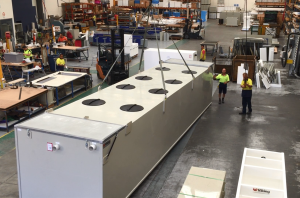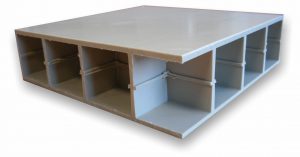To understand the difference between rotomolded and plastic fabricated tanks, it is essential to weigh the limitations of rotomolding against the benefits of the fabrication process. While rotomolded tanks are a popular option for many, they have certain constraints. On the other hand, plastic fabricated tanks offer unique advantages in certain scenarios.
 Custom Plastic Fabrication – Viking Plastics 30,000 litre Paneltim® Grease Trap
Custom Plastic Fabrication – Viking Plastics 30,000 litre Paneltim® Grease Trap
Viking Plastics is an Australian plastics fabricator specialising in grease traps, trade waste tanks, industrial tanks, and custom products. Known for their innovative use of Paneltim® plastic construction panels, Viking Plastics creates strong, corrosion-resistant, lightweight, durable tanks. Paneltim® panels have a 50mm thick injection moulded sandwich structure. The panels offer exceptional strength and rigidity, requiring less reinforcement compared to thin skin tanks, making it ideal for various applications.
Let’s explore the difference between rotomolded and plastic fabricated tanks.
Plastic Rotomolded Tanks
Rotomolded plastic tanks are produced by heating plastic material in a mould, rotating it to form uniform walls. While the process is widely used and effective for many applications, there are some key limitations.
- Limited Customisation
Rotomolded tanks are best suited for simpler, uniform shapes. Customisation in terms of size or specific design features is more difficult and can result in higher costs. If you need complex tank shapes, specific compartments, or unique integration with other systems, rotomolded tanks can fall short.
- Material Restrictions
Most rotomolded tanks are made from high-density polyethylene (HDPE), which is excellent for many applications but might not be suitable for certain chemical resistances, extreme temperatures, or highly specialised requirements. The limited variety of materials used in the rotomolding process can be a constraint when you need a tank that meets more stringent performance criteria.
- Structural Limitations
While rotomolded tanks are strong, their walls tend to have uniform thickness, which limits their strength in applications requiring more reinforcement. In high-pressure environments or for heavy-duty applications, rotomolded tanks may not provide the durability you need.
Paneltim® Plastic Fabricated Tanks
 Paneltim® Plastic Construction Panel
Paneltim® Plastic Construction Panel
Tanks fabricated with Paneltim® are made by assembling individual plastic panels, creating a modular system that can be customised more easily. Paneltim® construction panels are lightweight yet strong plastic sandwich panels with a honeycomb cell structure. They are rigid, easy to fabricate, and resistant to wear. Hygienic, easy to clean, and ideal for corrosive environments, they also offer excellent thermal and acoustic properties. Plus, they are 100% recyclable! These tanks offer distinct advantages over their rotomolded counterparts.
- Greater Customisation and Design Flexibility
One of the standout benefits of Paneltim® tanks is the ability to customise designs. Since the tanks are built from panels, they can be made to fit specific spaces, shapes, and requirements. Whether you need a tank with multiple compartments, unique dimensions, or custom fittings, Paneltim® tanks offer a high level of flexibility. This adaptability makes them an excellent choice for complex applications.
- Superior Material Versatility
Paneltim® tanks can be tailored to handle more specific environmental factors, such as resistance to particular chemicals, UV exposure, or extreme temperatures. This versatility allows you to select the ideal tank for your application, ensuring the tank meets exacting standards.
- Enhanced Strength and Durability
The injection molded, panel-based design of Paneltim® fabricated tanks results in superior strength. With the ability to reinforce critical areas, Paneltim® tanks can handle higher pressures and more demanding environments. This added strength can be a significant advantage in industries where reliability and durability are paramount.
Choosing the Right Tank for Your Needs
To summarise the difference between rotomolded and plastic fabricated tanks, rotomolded plastic tanks are a reliable and cost-effective choice for many standard applications, but may not offer the flexibility or durability required for specialised or complex needs. In contrast, Paneltim® fabricated plastic tanks shine in their ability to be customised, their material versatility, and their enhanced strength. If your application requires a tank that can be tailored to fit a specific space or withstand unique conditions, Paneltim® tanks offer clear advantages. Ultimately, understanding your specific requirements will help guide your decision, ensuring you choose the right type of tank for the job.
For further information, or to discuss your needs, call Viking Plastics on 1800 143 143 or request a quote. Viking Plastics’ products are available for delivery Australia wide.